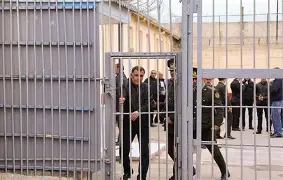Tribunat analyzes detention conditions in the context of national and international law
Recent concerns shared on social media about the conditions in Azerbaijan’s pre-trial detention centers and penitentiary institutions have sparked public debate. Information made public by detainees and prisoners suggests that sanitation levels in these facilities fall far short of standards compatible with human dignity.
Tribunat has examined these complaints within the framework of national legislation and international law.
Ali Zeynal, a journalist imprisoned in the Toplum TV case, addressed an open letter to the Minister of Justice, describing the conditions in Baku Pre-trial Detention Center:
“About 3-4 weeks ago, a delegation from the ministry visited… If only they had visited Cell 19, opposite Cell 12, I would have gladly shown them our personal belongings, clothes, and food contaminated by sewage. And, unless they were disgusted, I could have displayed the huge cockroaches. But forgive me—I would not speak of the rats crawling under the floorboards and through the sewage pipes. Even a sham inspection shouldn’t be subjected to such horror.”
Similarly, Afiaddin Mammadov, head of the Workers’ Table trade union confederation, reports that in Prison No. 2, rats roam freely in the kitchen, gnaw through food containers, and eat food. Mammadov says rats are present even in sleeping quarters, and that there are only four toilets for over 250 inmates. After speaking out, he was reportedly threatened with transfer to a higher-security facility.
Ulvi Hasanli, director of Abzas Media, described conditions in the quarantine area of Baku Pre-trial Detention Center:
“Inmates stay awake at night so bugs won’t crawl into their mouths or ears.”
Other detainees have raised similar concerns. Journalist Polad Aslanov reported that prisoners at Prison No. 15 were forced to contribute 100 manats each for the construction of a new bathhouse.
These accounts indicate that detention conditions do not meet minimum hygiene or sanitation requirements. However, both national and international laws require the state to guarantee humane conditions. Article 46 of Azerbaijan’s Constitution and Article 3 of the European Convention on Human Rights prohibit degrading treatment. The European Court of Human Rights (ECtHR) has repeatedly ruled that unsanitary conditions amount to degrading treatment — as in Canali v. France (para 53), where lack of hygiene caused feelings of humiliation, and Insanov v. Azerbaijan (para 116), where poor ventilation and improper toilet facilities violated Article 3.
Azerbaijan’s Law on Ensuring the Rights and Freedoms of Detainees (Article 22.1) requires authorities to provide detainees with conditions meeting sanitary and hygiene standards. The Code of Execution of Sentences (Article 10.2.1) guarantees conditions respectful of human dignity. The European Prison Rules require facilities to be kept clean and orderly at all times.
Despite these standards, conditions in Azerbaijan’s facilities clearly fall short. The Penitentiary Service Regulations task the service with ensuring compliance with hygiene requirements, and its head — the Deputy Minister of Justice — bears personal responsibility. Yet detainee complaints highlight persistent failures.
Although Azerbaijan’s penitentiary health programs have received substantial funding — over 63 million manats in the last five years — sanitation conditions remain dire. The ECtHR in Mamedova v. Russia (para 63) stressed that states must organize their prison systems with respect for human dignity, regardless of financial constraints.
The Ombudsman’s 2024 report notes 126 inspections of detention sites, but unsanitary conditions and rights violations persist. The European Committee for the Prevention of Torture (CPT) issued a public statement in July 2024 criticizing Azerbaijan’s failure to act on recommendations related to detainee treatment.
Tribunat concludes that the repeated complaints highlight the failure of the Penitentiary Service, the Ministry of Justice, and oversight bodies — particularly the Ombudsman — to uphold prisoners’ rights. Current conditions violate both Azerbaijan’s domestic laws and its international legal obligations.

